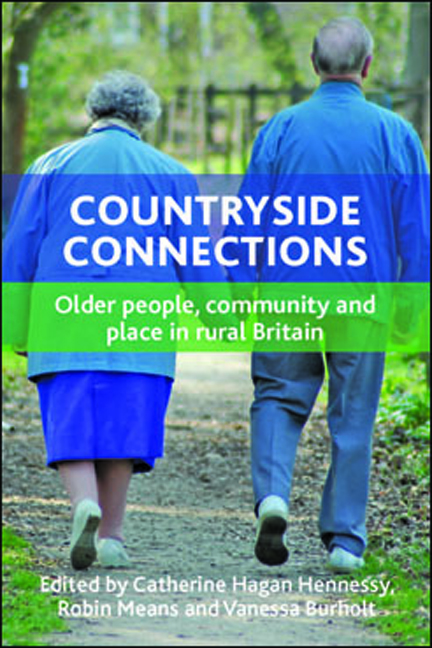Book contents
- Frontmatter
- Contents
- List of tables and figures
- Acknowledgements
- Notes on contributors
- Foreword
- one Countryside connections in later life: setting the scene
- two Conceptualising rural connectivities in later life
- three Rural connectivity and older people’s leisure participation
- four Connecting with community: the nature of belonging among rural elders
- five Beyond transport: understanding the role of mobilities in connecting rural elders in civic society
- six Deep mapping and rural connectivities
- seven Older people, low income and place: making connections in rural Britain
- eight Connecting with older people as project stakeholders: lessons for public participation and engagement in rural research
- nine Towards connectivity in a Grey and Pleasant Land?
- Index
two - Conceptualising rural connectivities in later life
Published online by Cambridge University Press: 04 March 2022
- Frontmatter
- Contents
- List of tables and figures
- Acknowledgements
- Notes on contributors
- Foreword
- one Countryside connections in later life: setting the scene
- two Conceptualising rural connectivities in later life
- three Rural connectivity and older people’s leisure participation
- four Connecting with community: the nature of belonging among rural elders
- five Beyond transport: understanding the role of mobilities in connecting rural elders in civic society
- six Deep mapping and rural connectivities
- seven Older people, low income and place: making connections in rural Britain
- eight Connecting with older people as project stakeholders: lessons for public participation and engagement in rural research
- nine Towards connectivity in a Grey and Pleasant Land?
- Index
Summary
Connectivity from a governance perspective
The way in which people connect with each other in particular places (such as rural areas) has been discussed and evaluated in many different ways. The dominant contemporary characterisation among policymakers and politicians the world over tends to be a functionalist one: people connecting together offer great potential for social integration, the development of collective values and social cohesion (Forrest and Kearns, 2001; Wilkinson, 2008). It is assumed that stronger integration and greater social cohesion will make society a better place (Jaffe and Quark, 2006). In relation to older people, this rationale is reflected, for example, in the national strategy on ageing for the UK (HM Government, 2009), which promotes building links between people of different generations as a means of strengthening bonds within communities. Governments produce guidance manuals on how to promote a sense of belonging in local communities (Department of Communities and Local Government, 2009) and government agencies develop measures to show how well connected communities are, with variables relating to trusting people, helping in the community, volunteering and generally being good citizens (Grootaert et al, 2004; Economic and Social Data Service, 2011).
This notion of social connectivity is a useful one for governments and tends to be a common policy objective, even where motives for introducing it might differ. There are a number of different political traditions that can lead to the common policy outcome of increased social connectivity. In the North American neo-liberal tradition, social connectivity shows how people have the ability to look after themselves and avoid the ignominy of dependence upon the state (Cruickshank, 1996; Wilkinson, 2010). It allows the development of personal freedoms, particularly where community action can release communities from publicly provided services over which they have little control (Lemke, 2001). Individual rights take over from state controls to allow individuals to reshape their lives (Rose, 1999).
In the UK, promoting increased social connectivity has allowed successive governments of all major political parties over the past 20 years to advocate (and develop policies for) ‘stakeholding’ societies, ‘active citizens’, ‘third way’ politics and the Big Society. Such independence from the state has also been advocated as a means of reducing exchequer cost (Taylor, 2003) and the size of government (Barnes et al, 2007), and is seen as a political justification for policies concerned with empowering communities.
- Type
- Chapter
- Information
- Countryside ConnectionsOlder People, Community and Place in Rural Britain, pp. 31 - 62Publisher: Bristol University PressPrint publication year: 2014



